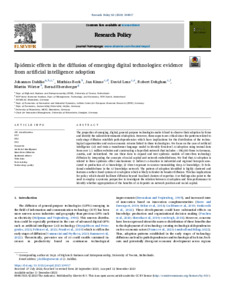|
Epidemic effects in the diffusion of emerging digital technologies: evidence from artificial intelligence adoption
Dahlke, Johannes
;
Beck, Mathias
;
Kinne, Jan
;
Lenz, David
;
Dehghan, Robert
;
Wörter, Martin
;
Ebersberger, Bernd
![[img]](https://madoc.bib.uni-mannheim.de/66335/1.hassmallThumbnailVersion/1-s2.0-S0048733323002019-main.pdf)  Vorschau |
|
PDF
1-s2.0-S0048733323002019-main.pdf
- Veröffentlichte Version
Download (7MB)
|
|
DOI:
|
https://doi.org/10.1016/j.respol.2023.104917
|
|
URL:
|
https://www.sciencedirect.com/science/article/pii/...
|
|
URN:
|
urn:nbn:de:bsz:180-madoc-663355
|
|
Dokumenttyp:
|
Zeitschriftenartikel
|
|
Erscheinungsjahr:
|
2024
|
|
Titel einer Zeitschrift oder einer Reihe:
|
Research Policy
|
|
Band/Volume:
|
53
|
|
Heft/Issue:
|
2, Article 104917
|
|
Seitenbereich:
|
1-24
|
|
Ort der Veröffentlichung:
|
Amsterdam [u.a.]
|
|
Verlag:
|
Elsevier
|
|
ISSN:
|
0048-7333 , 1873-7625
|
|
Sprache der Veröffentlichung:
|
Englisch
|
|
Einrichtung:
|
Außerfakultäre Einrichtungen > Institut für Mittelstandsforschung (ifm)
Fakultät für Betriebswirtschaftslehre > Mittelstandsforschung u. Entrepreneurship (Woywode 2007-)
|
|
Bereits vorhandene Lizenz:
|
 Creative Commons Namensnennung 4.0 International (CC BY 4.0) Creative Commons Namensnennung 4.0 International (CC BY 4.0)
|
|
Fachgebiet:
|
330 Wirtschaft
|
|
Abstract:
|
The properties of emerging, digital, general-purpose technologies make it hard to observe their adoption by firms and identify the salient determinants of adoption. However, these aspects are critical since the patterns related to early-stage diffusion establish path-dependencies which have implications for the distribution of the technological opportunities and socio-economic returns linked to these technologies. We focus on the case of artificial intelligence (AI) and train a transformer language model to identify firm-level AI adoption using textual data from over 1.1 million websites and constructing a hyperlink network that includes >380,000 firms in Germany, Austria, and Switzerland. We use these data to expand and test epidemic models of inter-firm technology diffusion by integrating the concepts of social capital and network embeddedness. We find that AI adoption is related to three epidemic effect mechanisms: 1) Indirect co-location in industrial and regional hot-spots associated to production of AI knowledge; 2) Direct exposure to sources transmitting deep AI knowledge; 3) Relational embeddedness in the AI knowledge network. The pattern of adoption identified is highly clustered and features a rather closed system of AI adopters which is likely to hinder its broader diffusion. This has implications for policy which should facilitate diffusion beyond localized clusters of expertise. Our findings also point to the need to employ a systemic perspective to investigate the relation between AI adoption and firm performance to identify whether appropriation of the benefits of AI depends on network position and social capital.
|
 | Dieser Eintrag ist Teil der Universitätsbibliographie. |
 | Das Dokument wird vom Publikationsserver der Universitätsbibliothek Mannheim bereitgestellt. |
 Suche Autoren in Suche Autoren in
BASE:
Dahlke, Johannes
;
Beck, Mathias
;
Kinne, Jan
;
Lenz, David
;
Dehghan, Robert
;
Wörter, Martin
;
Ebersberger, Bernd
Google Scholar:
Dahlke, Johannes
;
Beck, Mathias
;
Kinne, Jan
;
Lenz, David
;
Dehghan, Robert
;
Wörter, Martin
;
Ebersberger, Bernd
Sie haben einen Fehler gefunden? Teilen Sie uns Ihren Korrekturwunsch bitte hier mit: E-Mail
Actions (login required)
 |
Eintrag anzeigen |
|
|



 Creative Commons Namensnennung 4.0 International (CC BY 4.0)
Creative Commons Namensnennung 4.0 International (CC BY 4.0) Suche Autoren in
Suche Autoren in